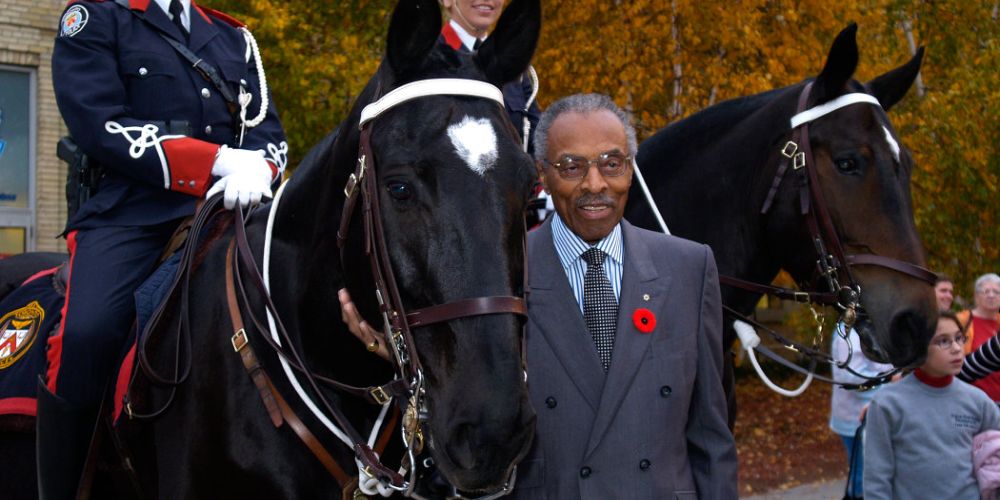Lincoln Alexander: Ontario’s 24th Lieutenant Governor

Lincoln Alexander was the 24th Lieutenant Governor of Ontario, serving between 1985 and 1991. He was the first member of a racialized community to be appointed to the position and serve as the Queen’s representative in Canada. He was also the first Black person to be a member of Parliament and Cabinet minister.
A Brief History Of Lincoln Alexander
Lincoln Alexander (often called Linc) was born in Toronto in 1922. He was the first of two sons born to his Caribbean parents. His father, George Alexander, was a carpenter from St Vincent and the Grenadines and worked as a porter for CPR. His mother was a maid.
When he was a teenager, Alexander’s parents divorced. Following the divorce, he moved with his mother to Harlem in New York City. He once wrote of his experience in Harlem, saying the city “stiffened my resolve to be more than a porter.”
RELATED: Learn more about local Black History Month events, programming, and initiatives …
Enlisting In The Military
In 1939 he returned to Toronto. Too young to enlist in WWII, he worked at a factory in Hamilton building air-craft guns. Three years later, he joined the Royal Canadian Air Force. Because of his poor eyesight, he could not be trained for combat. Instead, he trained and served as a wireless operator with the British Commonwealth Air Training Plan in Portage la Prairie, Manitoba.
By the time he was discharged, Alexander was a corporal.
Following WWII, Alexander attended McMaster University where he graduated in 1949 with a Bachelor Of Arts. He then went on to earn a degree from Osgoode Hall Law School in 1953.
Alexander eventually started his own law firm after practicing at a small firm in Hamilton.
The Start Of A Political Career
Alexander’s attention eventually turned from law to politics. In his memoir, he recalls a tour he did through Africa, which had a major impact on the way he saw himself and the world.
“The experience was an eye-opener for me, not only as a lawyer, but also as a human being, because I began to realize what Black people could do. I saw that, unlike the Hollywood version, these Africans were men and women of significant talents. I became conscious of my Blackness. I had come from a White world. Now we were in Africa, and I realized we are people of skill and creativity. I was a Black man and I was a somebody. I started standing tall.”
In 1965, Alexander ran as a Conservative MP for Hamilton West. He was defeated but won a seat 3 years later on June 25, 1968, making him the first person of colour to sit in the House Of Commons.
During his first speech, he said, “I am not the spokesman for the Negro; that honour has not been given to me. Do not let me ever give anyone that impression. However, I want the record to show that I accept the responsibility of speaking for him and all others in this great nation who feel that they are the subjects of discrimination because of race, creed or colour.”
The First Black Man In Federal Cabinet
In 1979, he was appointed as the Minister of Labour. This was the first time a Black person had held a cabinet position. After being re-elected 4 times and serving for 12 years, Alexander resigned in 1980 to become chairman of the Ontario Worker’s Compensation Board.
RELATED: Jean Augustine – The first black woman in parliament ...
Five years later, Alexander became Canada’s first Black lieutenant governor. He held the position in Ontario until 1991. His mandate during this time was to:
- fight racism
- advance the cause of youth
- advocate for seniors
After his term ended, he served 5 terms as the chancellor of the University of Guelph, chair of the Canadian Race Relations Foundation.
Alexander passed away in 2012, but his legacy lives on as an advocate for Black Canadians whose dignity, compassion, humanity, and judgment won’t be forgotten.
In December 2013, Ontario declared January 21 Lincoln Alexander Day. The day celebrates Lincoln’s life as “an example of service, determination, and humility. Always fighting for equal rights for all races in our society, and doing so without malice, he changed attitudes and contributed greatly to the inclusiveness and tolerance of Canada today.”
FAQ: Lincoln Alexander’s Life and Legacy'
Lincoln Alexander was a Canadian lawyer, politician, and advocate for racial equality. He was the first Black Canadian to serve as a Member of Parliament, a federal cabinet minister, and the Lieutenant Governor of Ontario.
He was born on January 21, 1922, in Toronto, Ontario.
During World War II, he served in the Royal Canadian Air Force as a wireless operator, though he was unable to train for combat due to poor eyesight.
He attended McMaster University and later Osgoode Hall Law School, becoming a lawyer before entering politics.
He first ran for office in 1965 and was elected as the Member of Parliament for Hamilton West in 1968, making him the first Black Canadian MP.
Alexander focused on fighting racial discrimination and advocating for labor rights, eventually becoming Canada’s first Black federal cabinet minister in 1979 as Minister of Labour.
He became chairman of the Ontario Worker’s Compensation Board and later served as the Lieutenant Governor of Ontario from 1985 to 1991.
He passed away on October 19, 2012.
In December 2013, Ontario officially declared January 21 as Lincoln Alexander Day to honor his contributions to Canada’s progress on racial equality, public service, and social justice.
Beat FOMO by being in the know!
Sign up for our newsletter today and never miss a beat.







